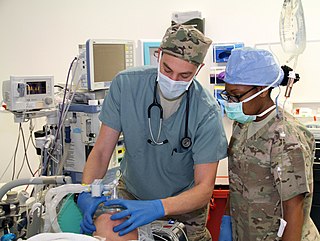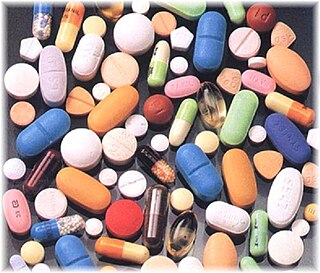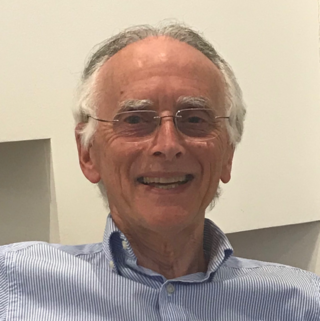Related Research Articles

Medicine is the science and practice of caring for a patient, managing the diagnosis, prognosis, prevention, treatment, palliation of their injury or disease, and promoting their health. Medicine encompasses a variety of health care practices evolved to maintain and restore health by the prevention and treatment of illness. Contemporary medicine applies biomedical sciences, biomedical research, genetics, and medical technology to diagnose, treat, and prevent injury and disease, typically through pharmaceuticals or surgery, but also through therapies as diverse as psychotherapy, external splints and traction, medical devices, biologics, and ionizing radiation, amongst others.

Pharmacology is a science of medical drug and medication, including a substance's origin, composition, pharmacokinetics, therapeutic use, and toxicology. More specifically, it is the study of the interactions that occur between a living organism and chemicals that affect normal or abnormal biochemical function. If substances have medicinal properties, they are considered pharmaceuticals.

Pathology is the study of disease and injury. The word pathology also refers to the study of disease in general, incorporating a wide range of biology research fields and medical practices. However, when used in the context of modern medical treatment, the term is often used in a narrower fashion to refer to processes and tests that fall within the contemporary medical field of "general pathology", an area that includes a number of distinct but inter-related medical specialties that diagnose disease, mostly through analysis of tissue and human cell samples. Idiomatically, "a pathology" may also refer to the predicted or actual progression of particular diseases, and the affix pathy is sometimes used to indicate a state of disease in cases of both physical ailment and psychological conditions. A physician practicing pathology is called a pathologist.

A pharmacist is a healthcare professional who specializes in the preparation, dispensing, and management of medications and who provides pharmaceutical advice and guidance. Pharmacists often serve as primary care providers in the community, and may offer other services such as health screenings and immunizations.
Internal medicine, also known as general internal medicine in Commonwealth nations, is a medical specialty for medical doctors focused on the prevention, diagnosis, and treatment of internal diseases in adults. Medical practitioners of internal medicine are referred to as internists, or physicians in Commonwealth nations. Internists possess specialized skills in managing patients with undifferentiated or multi-system disease processes. They provide care to both hospitalized (inpatient) and ambulatory (outpatient) patients and often contribute significantly to teaching and research. Internists are qualified physicians who have undergone postgraduate training in internal medicine, and should not be confused with "interns”, a term commonly used for a medical doctor who has obtained a medical degree but does not yet have a license to practice medicine unsupervised.

Pharmacy is the science and practice of discovering, producing, preparing, dispensing, reviewing and monitoring medications, aiming to ensure the safe, effective, and affordable use of medicines. It is a miscellaneous science as it links health sciences with pharmaceutical sciences and natural sciences. The professional practice is becoming more clinically oriented as most of the drugs are now manufactured by pharmaceutical industries. Based on the setting, pharmacy practice is either classified as community or institutional pharmacy. Providing direct patient care in the community of institutional pharmacies is considered clinical pharmacy.

Anesthesiology, anaesthesiology, or anaesthesia is the medical specialty concerned with the total perioperative care of patients before, during and after surgery. It encompasses anesthesia, intensive care medicine, critical emergency medicine, and pain medicine. A physician specialized in anesthesiology is called an anesthesiologist, anaesthesiologist, or anaesthetist, depending on the country. In some countries the terms are synonymous, while in other countries they refer to different positions and anesthetist is only used for non-physicians, such as nurse anesthetists.

Podiatry, or podiatric medicine and surgery, is a branch of medicine devoted to the study, diagnosis, and treatment of disorders of the foot and ankle. The healthcare professional is known as a podiatrist. The US podiatric medical school curriculum includes lower extremity anatomy, general human anatomy, physiology, general medicine, physical assessment, biochemistry, neurobiology, pathophysiology, genetics and embryology, microbiology, histology, pharmacology, women's health, physical rehabilitation, sports medicine, research, ethics and jurisprudence, biomechanics, general principles of orthopedic surgery, plastic surgery, and foot and ankle surgery.

Polypharmacy (polypragmasia) is an umbrella term to describe the simultaneous use of multiple medicines by a patient for their conditions. The term polypharmacy is often defined as regularly taking five or more medicines but there is no standard definition and the term has also been used in the context of when a person is prescribed 2 or more medications at the same time. Polypharmacy may be the consequence of having multiple long-term conditions, also known as multimorbidity and is more common in people who are older. In some cases, an excessive number of medications at the same time is worrisome, especially for people who are older with many chronic health conditions, because this increases the risk of an adverse event in that population. In many cases, polypharmacy cannot be avoided, but 'appropriate polypharmacy' practices are encouraged to decrease the risk of adverse effects. Appropriate polypharmacy is defined as the practice of prescribing for a person who has multiple conditions or complex health needs by ensuring that medications prescribed are optimized and follow 'best evidence' practices.

Sports medicine is a branch of medicine that deals with physical fitness and the treatment and prevention of injuries related to sports and exercise. Although most sports teams have employed team physicians for many years, it is only since the late 20th century that sports medicine emerged as a distinct field of health care. In some countries, sports medicine is a recognized medical specialty. In the majority of countries where sports medicine is recognized and practiced, it is a physician (non-surgical) specialty, but in some, it can equally be a surgical or non-surgical medical specialty, and also a specialty field within primary care. In other contexts, the field of sports medicine encompasses the scope of both medical specialists as well as allied health practitioners who work in the field of sport, such as physiotherapists, athletic trainers, podiatrists and exercise physiologists.

The Council for International Organizations of Medical Sciences (CIOMS) is an international non-governmental organization of 40 international, national, and associate member groups representing the biomedical science community. It was jointly established by the World Health Organization (WHO) and United Nations Educational, Scientific and Cultural Organization (UNESCO) in 1949 as a successor to the International Medical Congress that organized 17 conferences from 1867 until the 1913 outbreak of World War One.
A medical specialty is a branch of medical practice that is focused on a defined group of patients, diseases, skills, or philosophy. Examples include those branches of medicine that deal exclusively with children (paediatrics), cancer (oncology), laboratory medicine (pathology), or primary care. After completing medical school or other basic training, physicians or surgeons and other clinicians usually further their medical education in a specific specialty of medicine by completing a multiple-year residency to become a specialist.
Pharmacotherapy, also known as pharmacological therapy or drug therapy, is defined as medical treatment that utilizes one or more pharmaceutical drugs to improve on-going symptoms, treat the underlying condition, or act as a prevention for other diseases (prophylaxis).
Raymond L. Woosley is an American pharmacologist who is the founding president and chairman of the board for AZCERT, a not-for-profit organization dedicated to improved outcomes from the use of medications. Prior to leading AZCERT, he was founder and President of Critical Path Institute (C-Path). C-Path is an independent, non-profit organization created by the U.S. Food and Drug Administration (FDA) and the University of Arizona to help launch the critical path initiative. Previously, he has served as Vice-President for Health Sciences and Dean of the College of Medicine at the University of Arizona. He is Professor of Medicine and Biomedical Informatics in the University of Arizona College of Medicine - Phoenix, Arizona.
The Faculty of Pharmaceutical Medicine (FPM) is a faculty of the three Royal Colleges of Physicians of the United Kingdom. It is a UK-based professional membership organisation with 1,600 members; physicians with a professional interest in the speciality of pharmaceutical medicine, the science of discovering, developing and testing new drugs, their regulation, and monitoring them for safety both during development and when they are prescribed. FPM is a registered charity and ultimately exists to bring about an improvement in health in patients and the general population.
Donald Robert James Singer was a British clinical pharmacologist who was the president of the Fellowship of Postgraduate Medicine.

David John Webb, is a British physician, scientist and clinical pharmacologist, who currently holds the Christison Chair of Therapeutics and Clinical Pharmacology at the University of Edinburgh.

Malcolm Rowland FBPhS is Emeritus Professor of Pharmacy, University of Manchester, and Adjunct Professor, University of California San Francisco. His research in pharmacology, has been particularly in physiologically based pharmacokinetics. He has written several textbooks on the subject.
Dr Jean Gray is a Canadian academic and retired physician, who is professor emeritus of medical education, medicine and pharmacology at Dalhousie University. She has served as president of the Canadian and American Society of Clinical Pharmacology. She was invested as a Member of the Order of Canada in 2005, and has been a Fellow of the Royal College of Physicians since 2007. She was inducted into the Canadian Medical Hall of Fame in 2020.
References
- ↑ Stonier PD, Silva H, Lahon H (2007). "Pharmaceutical Medicine". International Journal of Pharmaceutical Medicine. 21 (4): 253–262. doi:10.2165/00124363-200721040-00001. S2CID 23959528.
- ↑ "International Federation of Associations of Pharmaceutical Physicians".
- ↑ "Faculty of Pharmaceutical Medicine".
- ↑ Pharmaceutical Medicine. Link text
- ↑ Daniels S (2011). "Pharmaceutical Medicine in the UK". Pharmaceutical Medicine. 25 (1): 1–5. doi:10.1007/bf03256841. S2CID 20925734.
- ↑ Traber M, Althaus B (2010). "Pharmaceutical Medicine in Switzerland". Pharmaceutical Medicine. 24 (2): 75–81. doi:10.1007/bf03256800. S2CID 26408034.
- ↑ Cohen-Munoz V, Llopiz-Aviles M, Llorens F, et al. (2010). "Pharmaceutical Medicine in Mexico". Pharmaceutical Medicine. 24 (4): 211–218. doi:10.1007/bf03256818. S2CID 24177503.
- ↑ Procurios (2023-11-06). "Breaking News: "Pharmaceutical Medicine/Clinical Pharmacology": new specialty for MDs in Belgium". www.healixia.be. Retrieved 2024-01-15.
- ↑ Stonier P, Baber N (2000). "Clinical pharmacology and the Faculty of Pharmaceutical Medicine". British Journal of Clinical Pharmacology. 49 (6): 523–524. doi:10.1046/j.1365-2125.2000.00202.x. PMC 2015048 . PMID 10848714.